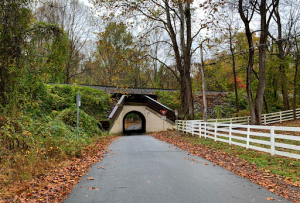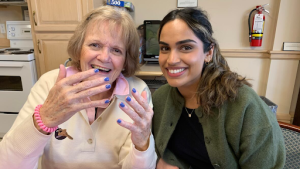
If you were at South Lakes last year, you probably would have heard of the name “Beck Baker”. Whether it be from the Seahawk Scoop, his role in Leadership, his gigs playing the drums at school events, being involved with the marching band, or just seeing him in the hallways, you couldn’t go a full school year without encountering the 6 foot 8 inch senior.
After graduating from South Lakes last year, Beck went off to take a gap year in Israel, where he now teaches kids how to play the drums, a passion of his. He was willing to do an interview amidst his busy schedule. Baker was planning on going to Penn State after his gap year, but is now reconsidering his options. Here are his questions and answers.
Q:What have you learned about yourself from being in Israel?
A: I’ve learned a lot; so much that I could talk about it for hours. I’ve learned about my strengths and weaknesses, found out if I can push myself beyond breaking point, and seen how much Hebrew I can read in the Torah when we pray. The past two months have helped me become so in touch with not only my physical self but also spiritual self. We’re being taught so much new content that I am able to relate to different topics, Jewish leaders from not only present times but also thousands of years ago, and really dive deep into what the texts are saying. I am still learning more about myself while I’m in Israel, and I plan on continuing to learn more about myself, but for now I have to keep figuring out the minor details. It takes time to get to the roots of one’s self but it’s worth the wait.
Q:What are your responsibilities in Israel?
A: My responsibilities in Israel vary tremendously. Not only do I have personal responsibilities such as running the kitchen committee to get food made, go shopping, etc, but I also have the responsibility of being the 10th man to daven (in Jewish culture, it is required that 10 people are needed for prayer), the responsibility of being a Jew, the responsibility of working the fields, and the responsibility of maintaining a set of standards once I return home to America. Though they seem very easy to some, keeping these responsibilities and learning from them will be a tremendous help in my everyday life back in the States and I am forever thankful for them.
Q: What differences do you find in Israel and the US?
A: The culture has to be one of the biggest differences I’ve seen since leaving the States. Don’t get me wrong, the US is absolutely a melting pot of culture and people, however Israel is different. When walking around various communities such as the Ethiopian neighborhoods in Ashdod, where there is a massive language barrier, I was welcomed with open arms to a delicious meal and very warm stay. Overall, the people living in Israel care for each other on a deeper level than I’ve seen in the United States and it’s made me realize how important change is when it comes to letting new people into my life and being more open to new ideas and decisions. I love being able to live in a country that thrives off of harboring community and welcoming new cultures with nothing but acceptance and warmth.
Q: Why did you decide to take a gap year in Israel and not go to Penn State immediately after high school?
A: Truthfully, my sister was one of my biggest inspirations and influences to go on the gap year. That being said, as much as she helped with the process, I do believe it was the right decision for me to take the year off and learn not only about myself religiously and on a personal level but also learn why the land of Israel is extremely important. Since coming to Israel, I’ve been able to read different scriptures, learn the ethics of our fathers, work the farms and get in touch with the roots of Judaism both on a physical and spiritual level, and meet many new people as well as learn different practical life skills. I knew I would be able to learn most of these on my own time, however, learning them in Israel just seemed much more fitting and like an experience I wouldn’t be able to turn down.
Q: Do you have a 40 hour work week like in the US?
A: Typically a work week at the program isn’t 40 hours. However, we do put in a decent amount of work. We spread out the work day by day and mix in classes in order to balance things out. Usually, we work Monday and Wednesdays by providing service to the community-whether it be a sports class, music courses, woodwork, teaching at the special needs school, etc. Tuesday mornings are the days where our work matters the most. Every week from 8-12:30 we go out to the fields and either pick an assortment of vegetation or weed them. It’s really fun being able to farm and know that I’m contributing to the local community’s income as well as hearing stories on what owning farms in the desert is like.
Q: Final question, what do you hope to leave behind when you return to the US?
A: I hope to leave the person I once was behind. Here in Israel, since day 1 of the program I’ve been called Ezra instead of Beck and I realize how much of a difference it makes on myself. I’ve been keeping kosher, practicing Shabbat and holidays, praying 3 times a day, and overall finding myself being a lot more Jewish than I was before. I plan to leave Beck Baker behind in Israel and come back to America with the same Jewish values I’ve been taught over the past year. It is important to me that I don’t break the traditions I’ve taken back home and I’m willing to sacrifice some of my old life in order to keep the values I have.
Thanks Beck for both his time and thoughtfulness for his answers, and we wish him the best in Israel!














